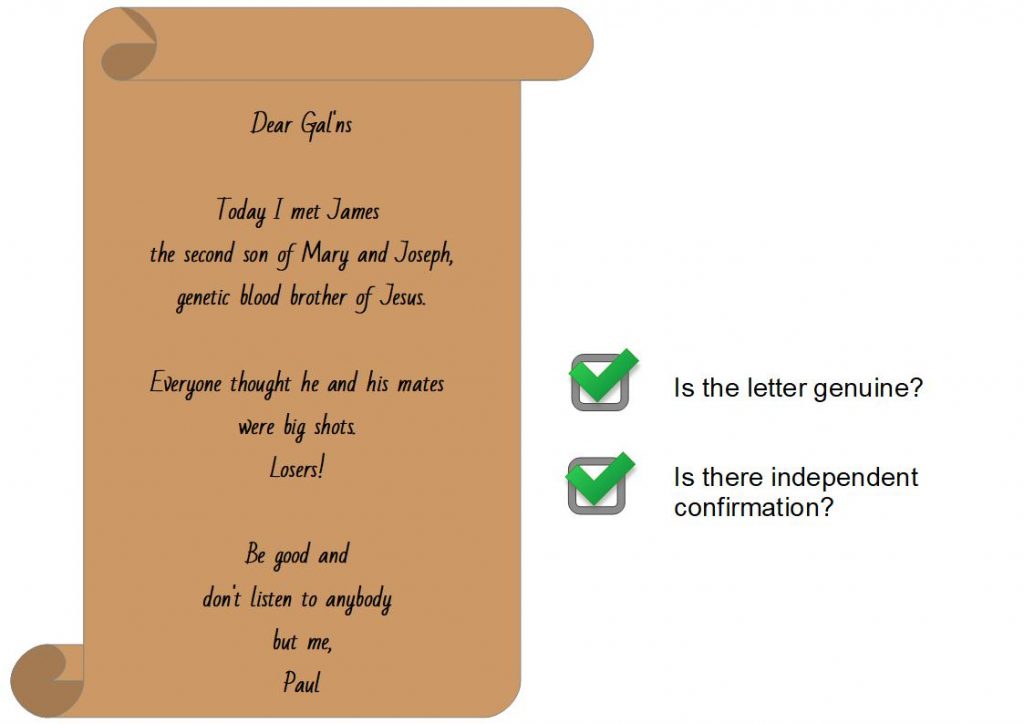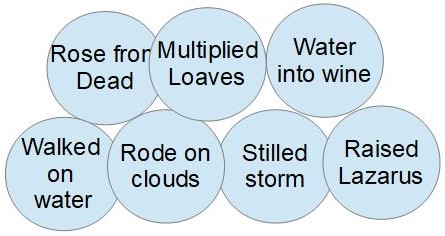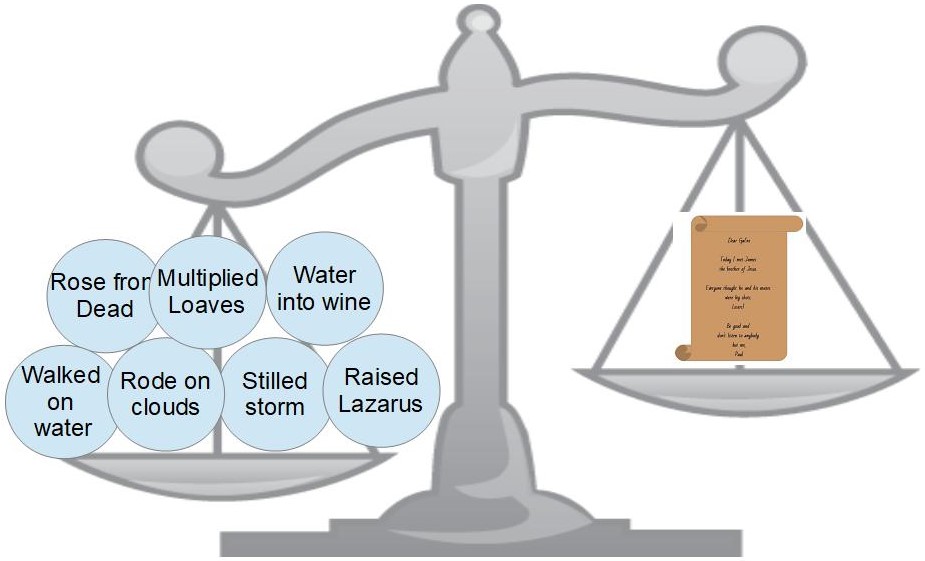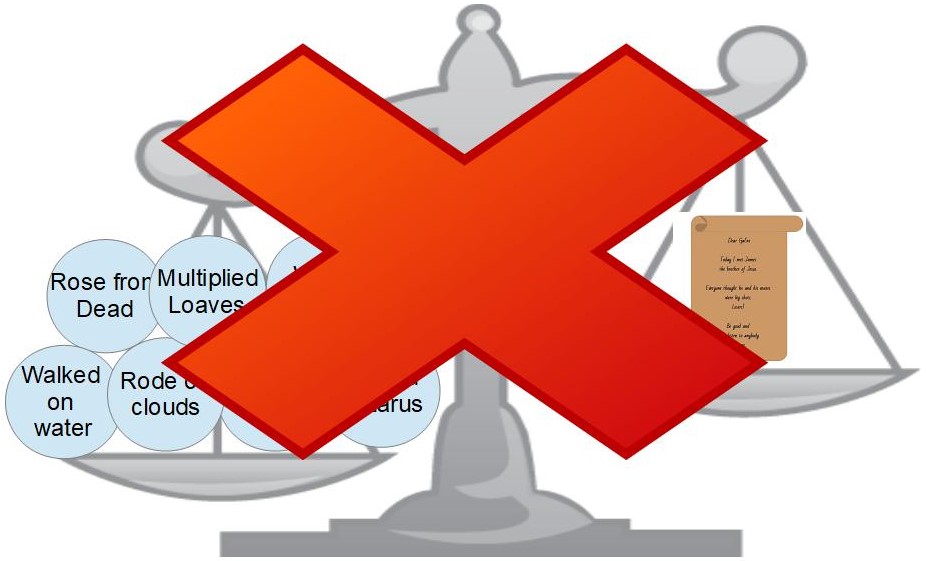A Roman Catholic historian who thinks he’s a Bayesian walks into the secret Vatican archives. There he discovers a document that might have significance for rewriting the origins of Christianity. I have reproduced a facsimile:
The historian is stunned. His faith has taught him that James was only a cousin or half-brother. If he was wrong about that, he wonders, how can he even be sure Jesus existed at all?
Reeling in doubts, the historian is nonetheless conscientious and no fool. He knows he has to test this document for its authenticity. So he snips off a corner of it and sends it to the laboratory to determine the age and provenance of the material. As an extra check he sends a high definition copy to a paleographer.
The results come back. The material is dated between 40 AD and 60 AD and the paleographic analysis confirms that the style to what was typical of the year 50 AD.
Next, he asks if the letter is genuinely by Paul. His colleagues tell him it sounds just like the Paul they know so that is confirmed.
Since this is evidently an autograph questions of the contents of the letter being altered during the process of copying do not arise.
But how reliable are its contents as historical evidence? Our historian asks if we can verify that this particular James really was known to be the literal brother of Jesus.
He consults the latest scholarship on the book of Acts and discovers that it is now established “beyond doubt” that the first chapters, 1-15, were written in the year 45 AD and that the original text said that James was not only the head of the church but was also the junior brother of Jesus, one year younger to be precise. The contents of Paul’s letter are confirmed!
But our historian is more thorough still. Did anyone else in the early church know anything of this letter and its contents? He pores through Tertullian’s writings and sees that Tertullian quotes the passage about meeting James to refute Marcion’s heresy that Jesus was not really a flesh and blood human being born of a woman on earth.
That clinched it! The letter and its contents sure seemed to be genuine and known to be genuine by the venerable Fathers.
But our historian is a Bayesian. At least he thinks he is. He read half of a blurb on the back cover of a book that had Bayes written on its front cover and is confident that he got the hang of it from that.
If he was wrong about Jesus having brothers how can he be sure Jesus even existed? The historian pauses to think of all the unbelievable stories about Jesus. Could such a person really have existed in the first place? So he puts on what he thinks is his Bayesian cap that looks very much like one of those conical dunce caps and sets to work.
He weighed the evidence. He took all the stories that were mythical and set them against the evidence for the reality of Jesus and here’s what he found:
The weight of numbers proved it. Jesus did not exist after all. He was entirely mythical. The claims of the letter were all bogus.
The historian thereby lost his faith and became an angry atheist with nothing to live for but drugs, sex and rock’n’roll before he finally died and went to hell.
If only our historian had cracked open that book on Bayes he would have known the above process was all wrong and his faith would have been saved.
Here’s what he should have done
He started out quite well. He put the physical document he discovered through various tests to try to determine the best explanation for its existence.
He then tested the contents of the letter against other data and determined that the best explanation for its claims was that really did meet James, a leader in the church, who really was a younger blood brother of Jesus.
The letter he had discovered was exactly what the sort of document that a historian might expect to find (if lucky) if indeed Paul had met a James who was a church leader and physical brother of Jesus.
But what of the other evidence that there were a lot of fantastical stories about Jesus? Did not they count against the evidence that Jesus was real and that therefore the letter’s claims had to be a sham?
Here’s how a genuine historian really works.
Just as he or she asks what is the best explanation for the contents of the letter, so he or she asks what is the best explanation for the contents of all the mythical stories of Jesus.
Question: What is the best explanation for the contents of this letter?
 Answer: That Paul really met James who really was the literal brother of Jesus.
Answer: That Paul really met James who really was the literal brother of Jesus.
-o-
Question: What is the best explanation for the contents of these stories?
 Answer 1: That Jesus was a very popular and charismatic person who inspired larger-than-life stories about him.
Answer 1: That Jesus was a very popular and charismatic person who inspired larger-than-life stories about him.
or
Answer 2: That Jesus was a theological figure who was the focus of religious stories.
or . . . .
Answer 1 is exactly what we would expect given what we know about the letter and its contents.
Answer 2 is not what we would expect given what we know about the letter and its contents.
Had our historian we met at the beginning of this post followed sound historical methods (and asked the sorts of questions that are also at the heart of Bayesian reasoning about evidence) his faith would have remained unshaken and he would not have gone to hell.
-o-
Doesn’t Bayesian method involve maths? Yes, and it also involves the construction of hypotheses. I have over-simplified the options in the above scenario so that the options are black and white and the probabilities are pretty much near certainty, let’s say 99% if you like. But the discussion of whether all historical questions are mathematical is another question I can discuss in another post, as one reader has suggested I do.
If you enjoyed this post, please consider donating to Vridar. Thanks!




The Bayes equation is a statistical tool using known values to calculate statistical probabilities. The current metaphysical usage of Bayes “logic” or Bayes “method” often uses attempts to reason toward values appropriate for usage in the equation, and thereby enters into philosophical speculation rather than statistical calculation.
It is good to reason to the best of our abilities. It is not so good to mislead ourselves that conscripting a tool for use where it has no legitimate application enables us to come to reasonable conclusions.
Reasoning to the best explanation is legitimate. Thinking you have done so by invoking the word Bayes is analogous to when apologists try to sound sciency when in fact they are arguing against known science.
Where does this view come from? Have you read any historian’s or archaeologist’s discussion of their use of Bayesian reasoning?
I guess it comes from ignorance. I have used Bayes statistically and have seen both sides of the atheist apologist divide try to use it and create applicable ‘priors’. This has been sufficiently comical to me that I turned away from the topic, evidently missing a valid process termed Bayesian reasoning.
Willing to learn more, and sorry for remarking about something I seem not to know anything about. I appreciate the graciousness of your reply!
In part as a response inspired by Clarke Owens’ suggestion and your query I plan to do a post discussing in more detail the relationship between Bayesian reasoning and history. Not sure how soon, though, but it’s in my to-do tray.
Its really wild that all these years later McGrath is still making weak and irrelevant criticisms of the christ myth theory.
One point where I disagree with Carrier is his claim that the early Christians were an anti-temple sect like the Qumran sect. I think Paula Fredriksen makes a good argument that Paul was too reverent of the temple to think it was being replaced. See Paula Fredriksen, “Paul: The Pagan’s Apostle (2017),” pp 25, 35, 154, 163, 165, 243n44, 245n52. I do agree with Carrier, on the other hand, that this seems to be the case with Mark engaging in the interplay between the withering fig story and the temple story.
There’s a fun discussion on this topic of Bayes Theorem going on over at McGrath’s site. See the comment sections:
(1) http://www.patheos.com/blogs/religionprof/2018/07/jesus-mythicism-two-truths-and-a-lie.html
(2) http://www.patheos.com/blogs/religionprof/2018/07/mythicist-math.html
Mostly just looks like group Carrier-bashing. And McGrath continuing to miss or just simply ignore the points Carrier attempts to make.
It’s interesting that the thought experiment here is being conducted from the point of view of a “A Roman Catholic historian.” I imagine Bart Ehrman would say the Catholic historian is doing everything he can to avoid the plain meaning of the text to preserve his “perpetual virginity of Mary” bias, just as mythicists, according to Ehrman, work to avoid the plain meaning of the James passage in Galatians to preserve their “overthrow Christianity at all costs” bias. lol
Christianity is false regardless of whether Jesus was an a deified man or a historicized deity. That doesn’t mean it’s not an interesting question to investigate. There are a lot of oddities, a lot of things that don’t match up right, a lot of things that were intentionally not retained, and a lot of things that were changed, enough so that it’s a fair question to ask. If there is any bias, it is clearly coming from those whose faith (or careers) demand that Jesus was indeed historical.
“nothing to live for but drugs, sex and rock’n’roll ”
You make it sound like that’s a bad thing.
Here’s an example of using Bayesian logic without using complicated math formulas. This is an old (but still good) video of a Mormon deconvert. He’s recounting his deconversion story and at one point he brings up a water analogy about how you find “truth”.
Reading McGrath’s post about Gal 1.19, and saying that since “brother of the Lord” must mean a physical brotherhood therefore Jesus existed, is the equivalent of saying a cup of liquid is clear, therefore it cannot be any other liquid besides water. Even if water is more likely to be clear than other liquids, if any of the other tests for water support some other liquid, then it’s probably not water. You can’t use the “proof-text” of clear-therefore-water as some sort of ultimate refutation. That’s not how you use Bayes theorem; that’s the opposite of using Bayes.
And that’s the larger problem. McGrath is mixing up proof-texting and Bayesianism, which is why he’s still confused.
Oh the irony. McGrath, I understand, frequently posts laments and even sarcastic ridicule of those who use the bible to proof-text their favourite beliefs.